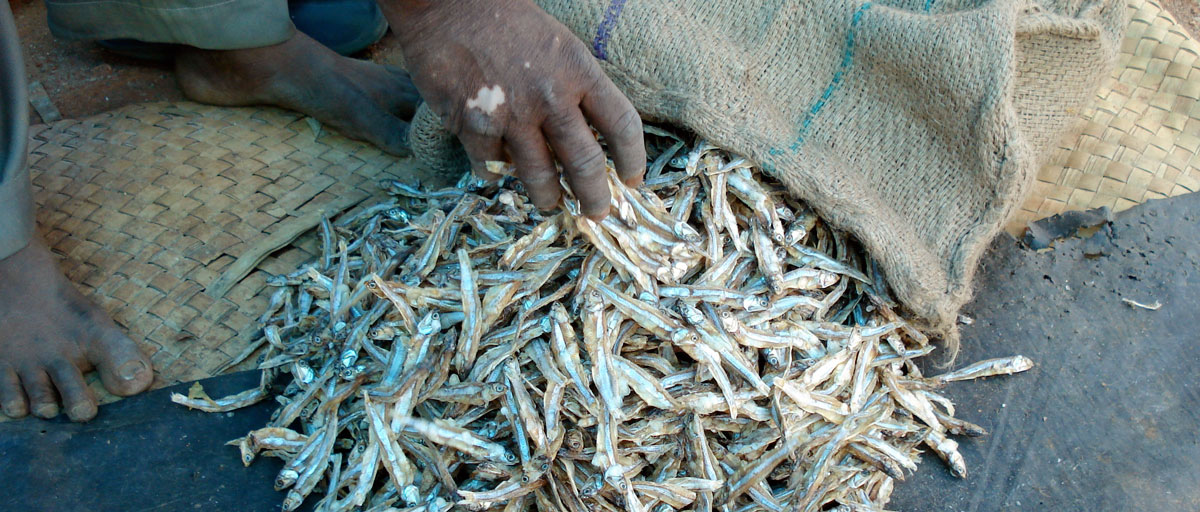
A new study argues that small pelagic fish should be promoted better as an affordable and highly nutritional source of food for humans, not just a resource for animal feed. Photo: M. Troell/Azote
Aquatic foods
Small in size, big on nutrition
Nutritious small pelagic fish should be used more in human food, not just animal feed
- The study reviews the nutritional composition of different farmed and captured aquatic food products and compares these with conventional
terrestrial meat products - Their conclusion is that aquatic food should be promoted better as an affordable and highly nutritional source of food, particularly for poorer parts of the world
- Small-sized marine pelagic fish could provide an affordable and nutritious option
It is a tragic irony that in a world where nearly 30 percent of the population suffers from malnutrion, an equivalent number of people suffers from an epidemic of excess caloric intake and obesity.
Nutritious food products are in high demand and aquatic food products represent an essential component of the global food basket.
An often ignored resource is small pelagic fish, a highly abundant and productive renewable protein which today is mostly used to feed other fish or as an ingredient to feed livestock. Today, a lot of this nutritious protein that could be available for human consumption particularly in developing countries is in fact being used for other purposes, i.e. fish meal as an ingredient in feed for livestock.
Edible aquatic plants or seaweeds could also play an important role, as they may contain considerable amounts of protein and micronutrient.
Strike a better balance
In a study recently published in Review in Fisheries Science, centre researcher Marc Metian, together with Albert Tacon from the University of São Paolo, have reviewed the role of aquatic food, and in particular small pelagic fish, in human nutrition. The article reviews the nutritional composition of different farmed and captured aquatic food products and compares these with conventional terrestrial meat products.
Their conclusion is that aquatic food should be promoted better as an affordable and highly nutritional source of food, particularly for poorer parts of the world. This means striking a better balance between providing food for human consumption and resources for animal feed, a difficult question in itself.
Small-sized marine pelagic fish could provide an affordable and much needed source of high quality animal protein and essential amino acids, omega-3 fatty acids, vitamins, minerals, and trace elements.
"As one of the best aquatic animal foods from a nutritional perspective, the direct consumption of particularly small pelagic fish should be encouraged and promoted, as opposed to the continued targeted use of these species solely for reduction into fishmeal and fish oil for use in animal feeds"
Marc Metian, co-author
A neglected resource
As for consumption, there are marked differences between countries and regions. African countries has the lowest per capita supply of aquatic animal food products in the world, while Asia, with its booming aquaculture sector, scores high.
It comes as no surprise then that Japan, a top consumer of fish products, is also the country with the highest reported life expectancy and one of the world's lowest incidences of obesity.
But changes can be seen elsewhere.
In Peru, the consumption of anchovies, which has been used for many years only to produce fishmeal and fish oil, has been promoted in many ways although a bulk of the catch is still destined for feeds. A rather original example is how anchovy pulp has become the main ingredient of a burger called "Omegaburger Kontiki" which has been a hit since it went on sale in mid March 2011.
"Aquatic animal food products are a richer source of most essential minerals and trace elements than most terrestrial meats," says Metian.
"Consequently, the continued reduction of these fish into fishmeal and fish oil for animal feed should be minimized and rather used directly as human food."






